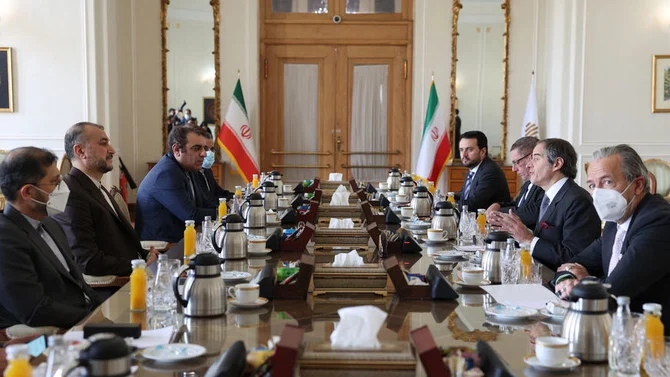
- ARAB NEWS
- 25 Apr 2024

The escalation of global tensions as a result of the Russia-Ukraine conflict, China-Taiwan stand-off, the medical and economic crises, and the exchanges between the Israeli state and the militant Palestinian Islamic Jihad movement has overshadowed the Iran nuclear deal talks.
Is reviving the Joint Comprehensive Plan of Action still on the table? Maybe it is no longer a breaking news story, but the Iranian regime and the US administration are definitely still trying to resurrect the 2015 agreement. On Thursday, a sudden call was made to all the international negotiating parties to resume the nuclear talks with Iran.
In fact, the indirect Vienna talks between Tehran and Washington had already begun, with a meeting between Iran’s top nuclear negotiator Ali Bagheri Kani and the EU’s European External Action Service Deputy Secretary-General Enrique Mora. The latter returned to his shuttling between Bagheri Kani and US special envoy to Iran Robert Malley.
In an op-ed published by the Financial Times late last month, EU foreign affairs chief Josep Borrell revealed that he had presented a new framework to relaunch the JCPOA.
It may indeed be the happy ending that the leaders of Iran and the US wish for if what the BBC published is proven true. It reported that an anonymous European official stated that Tehran’s demand for Washington to remove the Islamic Revolutionary Guard Corps from its official blacklist of “foreign terrorist organizations” had been dropped from the discussions and would instead be dealt with “in the future.” The source also revealed to the BBC that Washington would guarantee that no future US president could withdraw from the new deal.
However, the government in Tehran must realize that the US is a democratic country whose president is elected by its citizens. Therefore, no law obliges any future president not to cancel any agreement reached by a former leader.
The Iranians are clever enough to be well aware of this fact, but it does not matter what happens in the future, as long as it receives billions of dollars once the sanctions against this rogue state are lifted. As long as the Democrats are in power, nothing terrible will ever happen to them.
In the meantime, Tehran would be able to equip the IRGC to become the most significant force in the region, which would destabilize the already fragile security of some of Washington’s major allies.
During a meeting in Tehran on Saturday, IRGC head Maj. Gen. Hossein Salami told Ziad Nakhaleh, the Palestinian Islamic Jihad’s general-secretary, that his country was committed to supporting the movement until the end. Salami said that “all the anti-Zionist” capabilities “are on the scene in a united formation working to liberate Jerusalem and uphold the rights of the Palestinian people.”
The Iranian regime had been sending signals that Washington should be aware that the upcoming hours in Vienna could be decisive.
Dalia Al-Aqidi
How can Biden turn a blind eye to all the strategic threats of the Iranian regime unless there are reasons directly related to his unsecure position inside the US?
Prior to his departure to the Austrian capital, Malley posted on Twitter that he was preparing to resume the talks. “Our expectations are in check, but the United States welcomes EU efforts and is prepared for a good faith attempt to reach a deal. It will shortly be clear if Iran is prepared for the same,” his post read.
Meanwhile, the Iranian regime had been sending signals through various channels that Washington should be aware that the upcoming hours in Vienna could be decisive.
The Tehran Times quoted an anonymous Iranian diplomat as saying that the stability of an agreement lies in its balance. “Confidence for confidence. The alleged safeguards-related issues were created and had been continuing with political pressure and are political in nature. They must not be a pretext for future abuse against Iran,” the source said.
Iran gave Biden a deadline to increase the built-in pressure before the midterm elections, while the White House has been facing challenges left and right. If Malley’s team acquiesces to Iran’s demands, the gates of hell will be opened in the region. The result will harm many of Biden’s allies, while Tehran and its proxy militias will be the biggest winners.